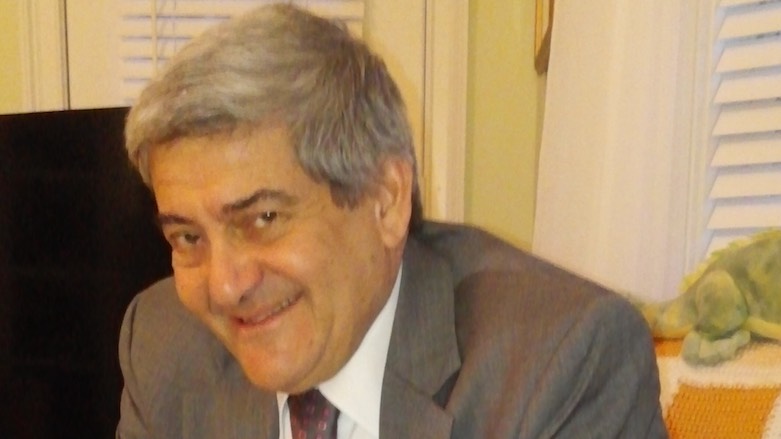Dr. Josef Olmert: It’s time for a Kurdish state!

WASHINGTON DC, United States (Kurdistan 24) – The Israeli-American scholar, Dr. Josef Olmert, believes the time for a Kurdish state is now. Earlier this month, he wrote a piece for the Huffington Post arguing just that.
It is a wonderful article, and so Kurdistan 24 contacted him to explore his thinking further.
The University of South Carolina professor is a historian, and his approach to Kurdish issues, as well as much else, reflects the intellectual depth of a scholar steeped in the region’s history.
The name which the ancient Greeks gave to the goddess who punished the arrogant was Nemesis. As Olmert explains the current, messy state of affairs in Iraq, it might well be called History’s Nemesis.
In Olmert’s view, Iraq was born in sin. Its very creation after World War I—carved by the victors out of the territory of the defeated Ottoman empire—“created a problem of legitimacy” that persists to this day.
“I would be the last one to blame the West for all the problems” of the Middle East, Olmert told Kurdistan 24. But, in the case of Iraq, “I would blame the British in the first place.”
“The Kurds were entitled to self-determination.” They were part of US President Woodrow Wilson’s Fourteen Points.
However, the British made, and then gave, the new state of Iraq to outsiders. That was “part of their payback to the Hashemites for the so-called Great Arab Revolt of World War I.”
The British did not consult with the local people—whether Arabs or Kurds—about what they wanted.
“From the very beginning, the British knew that the Kurds did not agree” to be part of the new Arab state, Olmert said.
“Throughout the 1920s, there were all kinds of troubles already in the Kurdish territories of Iraq,” he noted. “So, the British knew that they had done something that went against the expressed aspiration of at least a quarter of the population.”
Asked if Iraq can now survive as a state, Olmert replied, “Yes—but there are all kinds of states. One of them is what they call failed states.”
There are many problems in Iraq, he said. They include not only the Kurds but the Sunni Arabs, too.
“The Sunni population in Iraq will not accept the legitimacy of the Shia government, although it represents at least 50 percent of the population,” Olmert stated, “because it amounts to some kind of Iranian protectorate.”
Olmert explained these issues might not become critical immediately, or even in the short-to-medium term. Thus, others might dismiss such concerns as “alarmist.”
However, “In the end,” these matters “all implode, because you are talking about centuries upon centuries of legacy and history.”
In December 2002, as the US prepared for a war to oust Saddam Hussein, he spoke with Senator (later Vice-President) Joe Biden, who was visiting Israel.
“To his credit,” Olmert recalled, Biden anticipated “that Iraq would not survive as a unitarian state.”
In fact, Olmert believes it would be best to refashion the entire Sykes-Picot system and erase the border between Iraq and Syria, which was drawn to satisfy the interests of the French and British.
New boundaries should “allow the various communities to maintain their own separate, distinctiveness within some kind of general framework.”
It would be “very, very complicated,” but Olmert believes that should be the guiding principle for the future of both Iraq and Syria.
Olmert noted that Kurdistan Region President Masoud Barzani is under a lot of pressure to postpone the independence referendum, so Olmert is not entirely sure it will, in fact, be held on Sep. 25.
However, if it is held (then or any other time), “the results will be decisive” in favor of independence. “That will create a fact.” Then the key question will be how other parties, as well as the Kurdistan Region—people and government—respond.
Olmert concluded our discussion with a message: “I really wish that the brave Kurdish nation will finally find a way to assert itself in a new Middle East.”
“Like many other Israelis, Jews, and people who love freedom, I salute the bravery of the Peshmerga and the Kurdish nation.”
Editing by Karzan Sulaivany
